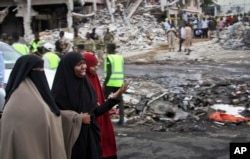Something extraordinary happened in the hours after the massive bomb attack that killed 358 people and wounded hundreds more in Mogadishu on Oct. 14: Hundreds of people rushed to hospitals to donate blood for the victims.
Such scenes are commonplace in many Western countries after a major disaster, such as the recent hurricane that ravaged the U.S. city of Houston. But in Somalia, a country ravaged by almost constant violence, social stigma and unfounded fears of needles or anemia have long prevented most people from donating blood.
As a result, the nation has lacked blood banks for more than two decades and hospitals have been hard-pressed to provide infusions to victims of blood loss. But a major effort to change those attitudes by a group of young doctors paid off in the wake of the latest terrorist atrocity.
Media campaign
Omar Habeeb, one of the recent graduates from Banadir medical school, said the group responded to the bombing by contacting hundreds of pre-registered blood volunteers and launching a social media campaign, including a Facebook appeal for donations from a reticent population.
“We have organized our team and many blood donor volunteers we pre-registered. Then, we posted messages and appeals for blood donors on our page — Somali Blood Donation Volunteers — which got half a million views in the same day of the blast. Then hundreds of people voluntarily poured to the hospitals to donate blood," said Habeeb.
Many of the volunteers were sent home because the hospitals were not equipped to store blood they did not need immediately. But the young doctors took advantage by registering the would-be donors for future needs, establishing what they call a "mobile blood bank.”
“The people donating the blood who showed up at the hospitals outnumbered the blood storage capacity of the hospitals. They were told that blood available was enough at the time. So, we took the momentum by doing a mobile banking process. We enrolled the donors to contact them for future blood donation,” Habeeb said.
No blood bank
Najma Ali Moalim, 28, another young doctor in the group, was among the first responders at the Mogadishu blast.
“The fact that the country has no blood bank, and that we have seen patients dying because of loss of blood, including children, pregnant women, and gunshot patients, we have decided to stand up and ask our people to donate,” she told VOA.
Mohamed Aden Jama, a young medical student was among the blood donors. “The blood is the most valuable thing to donate. And for me it means saving a life, saving the life of brother or sister,” said Jama. “Save a life as you would love to be saved when you need it.”
Religious scholars and health officials have long been using blood donation awareness campaigns to tell Somalis there are no religious restrictions against giving blood.
The doctors' group also joined other young Somalis to start a social media campaign to raise money for the families of the victims.





